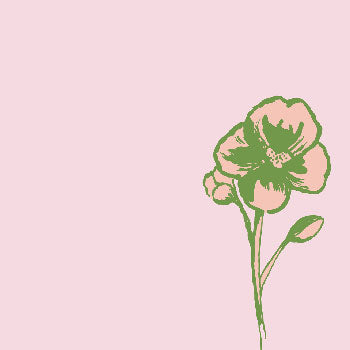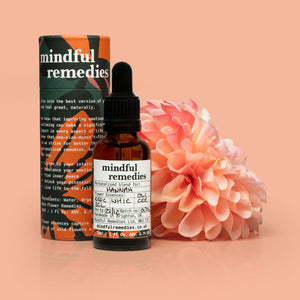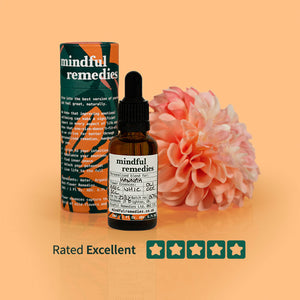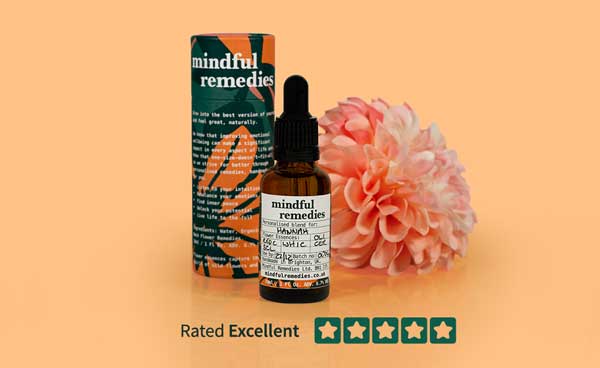your basket
- choosing a selection results in a full page refresh

Depression is a mood disorder that can impact your life in many ways. It can make it difficult to get out of bed in the morning, to enjoy activities you used to love, and even to interact with others. If you are feeling depressed, you are not alone. If you are struggling with depression, you may feel like there is no hope. However, there are many treatments available including talking therapy, antidepressants and natural remedies for depression that can help you get your life back on track. In this blog post, we will discuss Bach flower remedies for depression as a series of natural remedy and how they can help you find relief from your symptoms.
According to the World Health Organization, depression affects about 280 million people worldwide (about 5% of the world's population.) It is a common condition that impacts many aspects of your life including your mood and sense of well-being. A person may experience feelings of sadness, loss or anger as passing moods but this does not mean they are depressed. Depression occurs when these feelings persist for weeks or months and interfere with daily life. Depression can be debilitating for the person affected and can lead to suicide at its worst.
Depression can be difficult to manage on your own and it is important that you seek help from a medical professional if you are experiencing symptoms of depression. There are many treatments available for depression including Bach flower remedies, herbal remedies, cognitive behavioural therapy (CBT), talk therapy (psychotherapy) or antidepressants.

The symptoms of depression can vary from person to person. Some common symptoms include:
If you are experiencing these symptoms, it is important that you seek help from a health professional - there are many treatments available to help manage your symptoms.
Depression can be mild or severe and there are also some specific types of depression including -
Postnatal depression can affect new and expectant mothers, as well as their partners or spouses. This type of depression is referred to as postpartum depression and is treated similarly to other types of depression, with counselling sessions, antidepressant medications or natural remedies.
In bipolar disorder, there are times when the individual is sad or extremely happy (mania) - the depressive symptoms are comparable to those seen in clinical depression, but mania episodes might include harmful activities such as gambling or going on spending sprees.
Seasonal affective disorder (SAD) is a form of depression that has a seasonal pattern and generally relates to winter. It's often linked to a lack of sunlight during the winter or autumn months.
There are many herbal remedies for depression or vitamins that are said to help manage your symptoms. Some of these remedies include:
Check with your doctor before taking any herbal remedies for depression, particularly if taking any existing medication.
Unlike herbal remedies, Bach flower remedies work on an energetic level, similar to homeopathy. The remedies don't contain the actual flower specific to each flower remedy, they contain the energetic imprint of the flower. The remedies are created by placing the flower in water and then either leaving this in the sun or boiling it. This process transfers the energy of each flower to the water which is then preserved in brandy and used as flower remedies. These flower essences help to rebalance any energetic imbalance that may have occurred in the person, addressing any negative emotions. They can be used alongside any existing medication and won't interact or have any side effects.
Bach flower remedies are natural remedies that have been used in the treatment of emotional wellbeing, mental health and depression since 1930s and they're still popular today, used widely across the world. Many people have used Rescue Remedy which is a combination blend of five flower remedies used for emergency situations. There are in fact 38 different flower remedies, each relating to a different emotion. In this blog post we'll look at which Bach flower remedies can support depression and a description of the negative imbalance for each.
The main Bach flower remedies for depression are listed below. There are some other flower remedies that can also have an impact on depression (but usually not a primary factor.)
At Mindful Remedies we offer the ability to create your own personalised flower remedy blend choosing up to seven flower remedies in a treatment bottle. If any of the below resonate with you, you can you add up to seven individual remedies to your treatment bottle.

You feel despondent & discouraged after a setback. You are feeling low after an event which hasn't gone your way e.g. failed job interview, break up, poor exam results. Your attitude to the setback is quite negative and you get easily discouraged if things don't immediately go your way. You can be quite pessimistic and need plenty of encouragement. Sometimes your own attitude is what is holding you back. If not treated, this initial despondency and pessimism may become more chronic and require a remedy like Gorse which is for a depression which is more entrenched, whereby you've completely given up. The positive potential of Gentian is to have a positive attitude to your problems and understand that setbacks are a part of life and your ability to overcome these setbacks will make you stronger in the long run.

Gorse is a more deep depression than Gentian. You feel hopeless despair and complete resignation to your fate - an "oh what's the point" attitude. You are downhearted and unable to believe things may get better and you feel there’s no light at the end of the tunnel. You've given up fighting and can only be persuaded to keep trying by family or friends. This can often be accompanied by a chronic illness which has been long and arduous. The positive potential is to have hope, faith & strength from within that things will get better.

You feel depressed but you don't know why. This depression is quite melancholy, gloomy, like dark clouds descending without rhyme or reason. When this dark force comes down it is all consuming and has a big impact on your life and those around you. These feelings come and go with no reason. You have a reduced energy and lack of drive or joy. The positive potential of this remedy is joy and inner serenity that is not able to be shaken, no matter what life throws at them. It dispels gloom. This remedy can be helpful for SAD when the season changes can be depressing as well as menopause and postnatal depression.

You can see no end to your suffering. Complete mental despair, you’ve reached the limit of your endurance. You’ve been determined not to give up, but nothing works. It is one of the most negative soul states that one can be in, though quite often it doesn't present itself in this dramatic fashion, it can be more of an internal emotion sometimes not even consciously being known to the person. Sweet Chestnut types quite often also try to hide their inner mental despair from others and even when they've reached their limit they would not consider suicide, like a Cherry Plum person might. The positive potential is to restore hope, a strong character and lift sadness.

You fear you might lose control. Your nerves are stretched to breaking point and you can experience uncontrolled outbreaks of rage and anger. You feel like you’re heading for a breakdown or that you might have violent impulses against your normal character. Your thoughts can sometimes lead to thoughts of suicide, in which case please seek immediate support from your health practitioner. The positive potential is to have courage and composure.

You are apathetic to life and lack enthusiasm. You are resigned to your fate, lacking vitality or purpose. You have no motivation to take an active interest or bring positive changes to your life. You just sort of plod along without particularly enjoying life but without any motivation to do anything about it. You can be chronically bored, indifferent or feel empty. The positive potential is for enthusiasm and vitality for life.

Though not one of the main Bach flower remedies for depression, Willow can often go hand in hand. You are resentful and self-pitying. You feel sorry for yourself and blame others, can be sulky & bitter. Commons phrases coming out of your mouth include "Life can be so unfair." You never feel responsible for your own circumstances, it's always someone else' fault. You can carry a grudge and begrudge others good fortune. The positive potential is to take responsibility for your fate.
If you're suffering from insomnia, we also offer Bach flower remedies for insomnia.
If you're suffering from OCD, you might want to read our blog on Bach flower remedies for OCD.
If any of the above descriptions sound like yourself or someone you know, you may want to try some of these flower remedies for depression. At Mindful Remedies we create personalised bottles where you can choose up to seven individual flower remedies to make your own personalised blend.
Alternatively, you might want to consider flower therapy with a registered practitioner. This includes a 50 minute Bach flower remedy consultation which combines talking therapy as well as an expert providing you their recommendations on which remedies to choose. This is often helpful for people who aren't sure where to start with the remedies or if you're you'd like a supportive ear or a different perspective on your problems.
book a bach flower consultation
If you have been diagnosed with depression, there are some lifestyle changes that can help manage your symptoms and may even prevent the condition from developing.
Exercise - regular exercise is a great way to reduce stress levels which can trigger depression. It has also been shown that physical activity promotes good mental health by increasing production of endorphins (feel-good hormones) and serotonin (a hormone that helps regulate mood).
Try meditation or yoga - these activities help to calm your mind and body by encouraging you to focus on the present moment instead of worrying about past events which may have caused feelings of sadness or anxiety. This can reduce stress levels and make it easier for you to cope with stressful situations that arise in everyday life without becoming overwhelmed by them.
Limit alcohol consumption - excessive drinking can heighten feelings of depression, anxiety as well as other health problems. Try cutting back on how much you drink by setting limits for yourself and sticking with them (e.g., no more than two drinks).
Get enough sleep - depression and sleep have a direct relationship on each other and are interdependent e.g. if you're not getting enough sleep this can increase your risk of developing depression, and conversely you're more likely to have poor sleep if you have depression - this is one of the symptoms. Aim for around eight hours of quality sleep per night by going to bed and waking up at the same time each day, getting outside for some exercise, avoiding caffeine and electronic devices before bed, and using relaxation techniques such as yoga or meditation before turning in.
Challenge negative thoughts - therapy such as CBT can be helpful and focuses on your ability to change the way you think about a situation. It's not for everyone but maybe something to explore with your medical practitioner.
Depression is a serious mental health condition that can cause many complications if it's not properly treated. Fortunately, there are many options for treatment including therapy, antidepressants, natural remedies like Bach flower remedies or herbal supplements which available to help manage your symptoms and make life more manageable on a daily basis.

Since 2021, Lucy Edwards, a qualified Bach Flower Practitioner and the driving force behind Mindful Remedies, has connected with clients across the world. Crafting thousands of personalised remedies, Lucy has supported individuals' emotional wellbeing, shipping remedies to far-flung places like the USA, Thailand, and Australia.
Lucy is readily available for conversations, offering personalised advice to guide you on the path to holistic wellness. It's important to note that she's not only qualified but also registered with the Bach Centre, ensuring that every consultation and remedy adheres to Dr Bach’s original guidelines for expert care and efficacy.
Exclusive pricing 20% off your first subscription order and 5% off all future orders
VIP treatment Receive personalised advice from Lucy, free gifts & 15% off gift vouchers
Easy to manage Edit remedy, change schedule, pause or cancel at any time
Exclusive online workshops Access to workshops focusing on emotional wellbeing, guided by Lucy
Early access to new products Be the first to try out new remedies or wellness products, before anyone else



